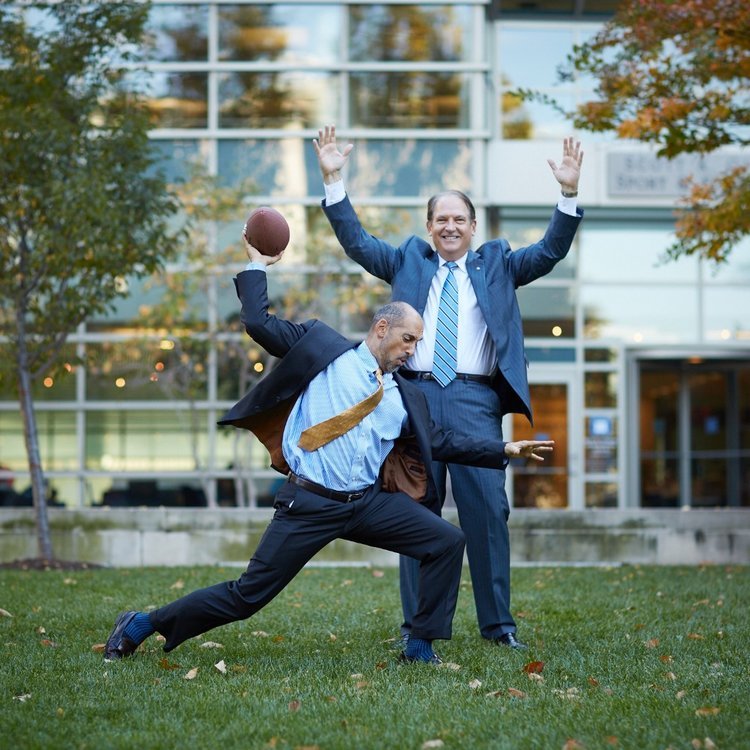Ending the Sports Blackout Rule
WE TOOK ON THE NFL, MLB, NHL, NBA, AND THE ENTIRE BROADCAST TV INDUSTRY IN AN EFFORT TO END THE FCC’S DECADES-OLD SPORTS BLACKOUT RULE. AND WON.
Starting back in 1975, the Federal Communications Commission’s Sports Blackout Rule required cable, and later satellite operators, to black out any game that a local broadcaster in any given market had to black out under league rules. The leagues, especially the NFL, imposed particularly anti-consumer local blackout policies. The NFL said that if a stadium did not sell out a few days prior to kickoff, the local broadcaster had to black out that game. This was designed to force fans to buy more tickets. The FCC’s regulation put the weight of the federal government behind extending the obnoxious league rule to cable and satellite TV providers.
Source: Mel Magazine
In practice, the NFL policy and FCC rule only served to hurt consumers and local businesses. Many fans could not afford the high price of tickets, parking, and concessions. At the height of the Great Recession, some particularly hard-hit cities had most of their games blacked out, especially Cincinnati, where 75% of local games were blacked out on local TV. In every market impacted by the threat of blackouts, local stores and broadcasters often ended up buying blocks of tickets just to keep the game on TV. It all reflected classic monopoly behavior: rather than lower prices, like airlines do when they want to sell out tickets on a flight, the NFL simply demanded its ransom. And everyone paid the price.
Sports Fans Coalition, founded and chaired by David Goodfriend, declared that the FCC’s Sports Blackout Rule ranked among the worst examples of government subsidizing multi-billion dollar sports leagues at the expense of consumers. SFC filed a Petition for Rulemaking at the FCC, joined by multiple public interest groups, to end the Sports Blackout Rule.
Building a grassroots army of NFL fans who had been harmed by the rule, including senior citizens and disabled veterans unable to attend their beloved home team’s games, Sports Fans Coalition won bipartisan support from Democrats, such as Sen. Richard Blumenthal (D-CT) and Rep. Brian Higgins (D-NY), and Republicans, most notably the late Sen. John McCain (R-AZ). SFC garnered earned media coverage in national, local, political, sports, and general interest press, including print, digital, radio, and social media. Goodfriend advocated before successive FCC chairmen, first to open a proceeding, then to issue proposed rule changes, and finally to schedule a final vote.
The NFL hit back with all the power and resources at its disposal. NFL Commissioner Roger Goodell personally lobbied FCC Commissioners. The league supported what it said was an independent fan group, headed by former MVP Lynn Swann, to try to show that fans actually supported the blackout rule. It corralled civil rights, labor, and other groups to pressure Democratic FCC Commissioners to oppose Sports Fans Coalition. The NFL and National Association of Broadcasters filed voluminous legal briefs and economic studies at the FCC.
Sports Fans Coalition and Goodfriend executed a strategy based on substance and politics. On the substance, we persuaded academic economists from Stanford, The University of Chicago, The University of Michigan, and other schools to file economic studies that showed why the NFL’s local blackout policy, and the FCC rule that underpinned it, simply no longer made any economic sense. With a team of bright Georgetown University Law Center students helping with research and drafting, we filed detailed legal analyses showing why the FCC retained complete discretion to eliminate the Sports Blackout Rule, and why doing so was in the public interest.
Politically, even though Democrats were in the majority at the time, we started by securing the support of the Republican FCC Commissioners, reasoning that doing so would pave the way for bipartisan support, rather than turning our issue into yet another “partisan football.” We told the Republicans that this was their opportunity to show that de-regulation can be pro-consumer, and that they should not turn their backs on the consumer advocates hoping to end the rule. With the public endorsement of then-Commissioner (later Chairman) Ajit Pai, we turned to the Democrats and argued that they should not be any less pro-consumer than their Republican colleagues. It worked.
On September 30, 2014, the FCC voted unanimously to end the Sports Blackout Rule. After almost four decades on the books, the rule disappeared. Days later, the NFL announced it would voluntarily suspend its local blackout policy.

